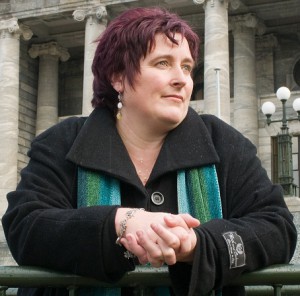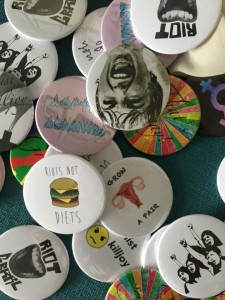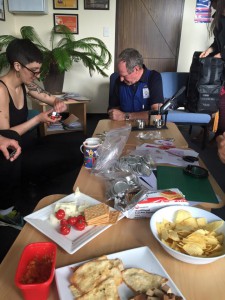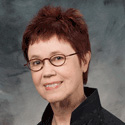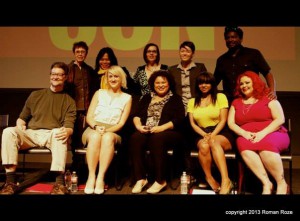trans/forming feminisms: media, technology, identity
participant biographies
Nikki Aaron (University of Otago, patricianicoleaaron@gmail.com) earned her PhD from the University of Otago in Religious Studies and Geography in May 2015. She has a MA from the University of Leeds, UK. Her research uses a Religion, Gender and Development approach to explore the relationship between contemporary devadasis of South India and the government and non-government organisations seeking to eradicate the devadasi tradition. As Dalit, rural, sex workers, many of whom are HIV+, devadasis are frequently targeted in rehabilitation schemes and anti-trafficking initiatives. Nikki is now focused on using her knowledge and skills as an activist in the New Zealand context.
Rohana Arrifin (rohanaariffin@yahoo.com) was an academic for over 30 years at University Science Malaysia. She has been a feminist activist since the early eighties. Rohana has several times been the president of the Women Crisis Centre, Penang and the president of PRM, a small but very old socialist party in Malaysia. She is also active in various other organisations including Staff association and Legal aid. Rohana has also written 7 books and numerous articles on Women workers and trade unions, Violence against women and Patriarchy and women.
Sylvia Baynes (Women’s Studies Association NZ, symyby@clear.net.nz) was born in Helensville, near Auckland, a part of the post World War II baby boom. At Auckland University, in the early 1970s, she was an enthusiastic Women’s Liberation supporter. While working mainly in Insurance, she also lectured part time in the Continuing Education Women’s Studies programme. She is a committee member of the Women’s Studies Association of New Zealand.
Lucinda Bennett (lucindajbennett@gmail.com) has recently completed her BA Honours in Art History at the University of Auckland where she is also one of the curatorial team at Window Gallery. She has a background in writing, directing and producing for theatre, and maintains her own creative and art writing practices.
Melanie Beres (University of Otago, melanie.beres@otago.ac.nz) is a senior lecturer in the Department of Sociology, Gender and Social Work at the University of Otago in New Zealand. Her programme of research is centered around the concept of sexual consent. She uses qualitative methodology to explore how young adults communicate and understand consent in their casual and long-term relationships. More recently her interests have expanded to include exploring constructions of consent and sexual violence prevention in varied contexts.
Karishma Beach (The University of Auckland, kbea210@aucklanduni.ac.nz) is analysing the culture and masculinity of self-identifying male “nerds” in social media spaces, as part of her Master of Arts degree, in Psychology at the University of Auckland. Her wider research interests include social justice and feminist issues, and the impact of social media in these areas.
Virginia Braun (The University of Auckland, v.braun@auckland.ac.nz) is a feminist and critical psychologist whose research has explored the intersecting areas of gender, bodies, sex/sexuality and health/wellbeing, and the possibilities, politics and ethics of lives lived in neoliberal times; now she’s excited to begin research on new food movements. She has an ongoing interest in the doing, developing, and teaching of qualitative research. With Victoria Clarke, she developed a popular approach to thematic analysis (http://www.psych.auckland.ac.nz/thematicanalysis) and co-authored Successful Qualitative Research: A practical guide for beginners (SAGE, 2013); they’re currently writing a book on thematic analysis for SAGE. See http://www.psych.auckland.ac.nz/uoa/virginia-braun/.
Shirin Brown was elected to a part-time role for the Waiheke Local Board, (Auckland Council) in 2013 and works across transport, economic development and the arts. She also teaches at AUT in digital design, makes films and writes plays, and is currently exploring the potential of stand up comedy in her creative practice. She is a member of the Green Party.
Sionainn Byrnes (The University of Canterbury, sionainn.byrnes@pg.canterbury.ac.nz) is a Masters student in English Literature at the University Canterbury. Her research explores various postcolonial, feminist, ecofeminist, and countercultural discourses, particularly as they relate to postmodern magic(al) realist fiction. She is a founding member, and the current President, of UC FemSoc, an intersectional feminist society based at the University of Canterbury. Sionainn edits (and is a regular contributor to) the quarterly feminist zine What She Said. She has also appeared on a number of panels relating to gender, feminism, and ecofeminism. Sionainn discussed the dual oppressions facing women and nonhuman nature at the 2014 UC FemSoc “That’s What She Said Intersectional Feminist Day Conference”, sat on the Christchurch WORD and UC College of Arts “How to be a Feminist” local panel on International Women’s Day this year (2015), and recently delivered a Pecha Kucha presentation on “Intersectional Feminism” at the 2015 UC Diversity Week “Gender Matters” session. As part of the “Women on the Waves” collective, Sionainn also hosts a monthly radio show on Plains FM, in which she discusses various feminist issues such as women in science and technology, the need for strong anti-racist and trans-inclusive practices within feminism, and the problems with liberal (or capitalist-friendly) feminism. Sionainn is a published poet – her poetry has appeared in the Fightback Aotearoa Magazine, both editions of the UC FemSoc annual poetry chapbook Not A Mused, and will also feature in the forthcoming Catalyst Poetry Magazine. She is a passionate educator and activist.
Octavia Calder-Dawe (University of Auckland, octavia.calder-dawe@auckland.ac.nz) is a critical feminist researcher and a doctoral candidate in the School of Psychology at the University of Auckland, New Zealand. Octavia’s action-oriented doctoral research project connects senior secondary school students with critical feminist analyses of gender, sexuality and bodies. Her thesis explores how those involved (re)negotiate their relationships to gender, feminism and sexism as a consequence.
Rahna Carusi (Massey University, R.Carusi@massey.ac.nz) has a PhD in Literary and Critical Theory from Georgia State University and specializes in psychoanalysis, feminisms, and queer theory. She teaches academic writing and literature papers at Massey University. She is currently revising a book manuscript on sexuation as discourse in Lacanian thought, as well as writing an article on the effectiveness of the hysteric’s discourse in the writing classroom. Settled 2 years in New Zealand, she is shamelessly looking for a permanent lecture position to solidify her new life in this wonderful country. She also wants to buy a house so she can have a dog.
Maud Ceuterick (University of Otago, maud.ceuterick@otago.ac.nz) holds a Master’s degree from the University of Cork (Ireland) and is currently a PhD student in Film studies at the University of Otago. Her main areas of research are feminism and issues of gender, space and mobility. Her thesis analyses women’s occupation of gendered spaces in contemporary cinema and how it manifests aesthetically.
Catherine Dale (University of Otago, catherine.dale@otago.ac.nz) has a PhD from the University of Otago and teaches in both the English and Gender Studies programmes. She is interested in the writings of Antonin Artaud, gender studies, contemporary visual art in New Zealand, and critic-fictional poetics.
Kevin Fletcher (University of Otago, kevinalanfletcher@gmail.com) is a PhD candidate in Communication Studies at the University of Otago. He graduated in 1997 from the University of Otago with a BA in German and in 2013 with an MA in German. His research interests include neoliberalism, children’s television and German film and television.
Milena Flynn (The University of Canterbury, mpe84@uclive.ac.nz) has just completed a political science and history degree at the University of Canterbury. Her research for 2015 will look at global development and gender inequality. She feels strongly that young people should be politically active, and co-founded FemSoc in 2013 and is its President for 2016.
Jessica Ford (University of New South Wales, j.a.ford@unsw.edu.au) is a Ph.D. Candidate and Postgraduate Teaching Fellow at UNSW Sydney in the School of the Arts & Media. She has written and published articles on the television series Buffy the Vampire Slayer and Community. Her research interests lie in contemporary American postnetwork television and television histories with a focus on gender and feminism.
Sylvia Frain (University of Otago, sylviacfrain@gmail.com) is a Ph.D. candidate with the National Centre for Peace and Conflict Studies at the University of Otago on the South Island of Aotearoa New Zealand and a Research Associate with the Micronesia Area Research Center (MARC) at the University of Guam, Micronesia. She focuses on visual cultural and the aesthetics of resistance, decolonization, and solidarity movements in the Oceania. She aims to contribute to the transformation of contemporary colonialism and militarization through Pacific arts practices. She also manages the Facebook Page: Oceania Resistance.
Fresh and Fruity (freshnfruitygallery@gmail.com) is always in a state of flux and challenging what it means to be both a digital collective and gallery. As a collective we connect through our shared lived experiences. This has empowered us through our ability to establish connections with other women both locally within our communities and abroad. We are interested in discussion around the challenges of being a person who identifies as ‘female’ in a proto-digital age within the fine arts industry. Our work is concerned with the intersections of race, class, gender and sexuality, especially in terms of the branded personifications of self online. Fresh and Fruity is a brand, but not a business. We are not necessarily interested in identifying with any specific movement within feminism, we draw from a series of different movements and try to function as an intersectional ‘safe’ space. We are more interested in challenging the way that neoliberalism manifests itself within the corporate sphere, which overlaps into the fine arts industry and how this impacts upon on persons who identify as women. Fresh and Fruity is interested in the performative, but inherently coded ‘self expression’ of proto-digital life. Social media is an integral part of our practice and our personal brand.
Jessamy Gleeson (Swinburne University, jessgleeson@swin.edu.au) is a PhD student at Swinburne University of Technology in Melbourne, Australia. She both works in and researches social media, feminism, online activism, and gender studies Outside of her research, Jessamy also assists in organising and participation in feminist campaigns and events, including Cherchez la Femme, SlutWalk, Girls On Film Festival, and Found Festival. She also manages two other vibrant feminists: Karen Pickering and Van Badham.
Olivia Hall (The University of Otago, olivia.c.e.hall@gmail.com) is a recent graduate from Otago University, having completed an arts degree in politics and gender studies. I am hoping to continue studying at Victoria University next year to complete my Honours degree in sociology. I am incredibly passionate about feminism and writing, and have found spoken word poetry to be a way to bring those things together. This year I won the Matariki Poetry Slam and have previously been a national finalist as well. I’m incredibly excited to be involved in my first conference and love being part of this community.
Carol Harrington (Victoria University, Carol.Harrington@vuw.ac.nz) is a senior lecturer in the School of Social and Cultural Studies, Victoria University of Wellington, New Zealand. Her research concerns politics and policy on violence against women, sexual violence and prostitution. She teaches courses on sociology of violence, social policy and knowledge politics. In addition to her book, Politicization of Sexual Violence from Abolitionism to Peacekeeping (Ashgate 2010) she has published articles on anti-sex trafficking policy in Bosnia and Kosovo, on gender expertise within peacekeeping operations and on prostitution knowledge politics in Timor Leste, Sweden and New Zealand.
Gala Hesson (University of Otago, gala.hesson@otago.ac.nz) is a user-centred communication designer, passionate about the space that design holds in both teaching and learning. Gala is interested in information visualisation, design thinking, critical realism, ecological philosophies, and design for social change.
During the day she works in the Educational Technology team at the Higher Education Development Centre, University of Otago. This involves working across the university supporting teaching and research with visual methods.
In her spare time Gala paints, collects vinyl, and helps non for profit groups most recently Dunedin Pride 2015. Gala believes that creativity is empowering, and that we are all creative beings. @galahesson
Siobhan Hodge (siobhan.c.hodge@gmail.com) has a doctorate in English literature from the University of Western Australia. Her research focused on Sappho’s poetry, its legacy of translation, and some historically subversive interpretations. Siobhan has had poetry, criticism and reviews published in several places, including Cordite, Plumwood Mountain, Limina, Peril, Verge, Yellow Field, and Contrapasso.
Tag Hooper (Curtin University, contact@taghooper.com) is a media studies doctoral student, currently conducting research on the comparative diversity gaps in Star Trek and X-Men adaptations, and examining why the under-representation of characters from marginalised social groups continues to persist even in the wildest fantasies about futuristic astronauts and super-humans.
Rosie Howells (rosiehowells92@gmail.com) is a comedy playwright and actress based in Wellington. Predominately, Howells is a writer, producer and performer of all woman comedy troupe Discharge, whose shows include Mary’s Christmas and 28 Days: A Period Piece. Rosie is currently studying at the New Zealand Film and Television School, specialising in script-writing.
Sue Jackson (Victoria University, Sue.Jackson@vuw.ac.nz) is a Senior Lecturer in the School of Psychology at Victoria University of Wellington, New Zealand. Her research focuses on gender and sexuality in relation to girlhood and she has a longstanding publication track record in this field. She has recently completed a project funded by the NZ Royal Society Marsden Fund examining pre-teen girls’ engagement with ‘sexualised’ popular culture and is now working on a newly commenced project investigating feminism in high schools.
Stevie Jepson (The University of Otago, stevie.s.jepson@gmail.com) has recently submitted her Masters thesis in Politics at the University of Otago, Dunedin. She is involved in feminist activism in Dunedin and is particularly interested in reproductive politics
Lloyd Jones (The University of Auckland, ljon077@aucklanduni.ac.nz) is an Honours graduate from the University of Auckland with research interests in masculinity and rape culture. He currently works as a rape prevention educator.
Rae Joyce drew attention to herself in the Auckland comics scene, first with “Escape Behaviours”, an epic web comic about stuttering, marriage breakdown and migration, and then by winning AUT’s graphic fiction competition with “Alchemy Hour”, a poem about surfing and loss. She has carved out a niche for herself as a graphic poet and her comics have been published internationally in literary journals and online. She was selected by the New Zealand Book Council to participate in the Graphic Novelist Residency Exchange with Taiwan, in association with PANZ and TIBE. Also known as Rachel J Fenton, she has also won numerous awards for her poetry and prose and was finalist for the 2014 Dundee International Book prize.
Gurleen Khandpur (University of Otago, gurleenkhandpur87@gmail.com) is a postgraduate student pursuing a Master’s degree in Philosophy from the University of Otago. Her thesis undertakes a conceptual analysis of Gender with an emphasis on the implications for applied ethics in various domains. She is passionate about fruitfully marrying academia with activism and as such her research interests include normative and applied ethics, gender, sexuality, and fat studies.
Jessica Kean (University of Sydney, jessica.kean@sydney.edu.au) is a sessional lecturer and tutor in the Department of Gender and Cultural Studies at the University of Sydney interested in intimacy, non-monogamy queer theory and mononormativity.
Kara Kennedy (University of Canterbury, kara.kennedy@pg.canterbury.ac.nz) is currently studying for a PhD in English at the University of Canterbury. Her focus is analysing gender in 1960s American science fiction novels. She holds a BA in English with a minor in Women’s Studies (from the US) and an MA in English with an emphasis in Gender and Culture (from the UK). Her previous work has looked at representations of women as well as masculinity in literature. She is a member of the General Executive of FemSoc and working on boosting its educational offerings by incorporating accessible feminist theory and concerns into interactive seminars. She is a web developer for nonprofit organizations who has always been comfortable around technology and has recently become involved in the expanding Digital Humanities field at the University of Canterbury.
Sarah Laing is an award-winning fiction writer, graphic designer and cartoonist. Random House has published a book of her short stories and two novels, her latest one encapsulating a graphic novella. She also has a publisher of her comics, Pikitia Press, who have released 5 issues of Let Me Be Frank. She has designed and illustrated many book covers and books for publishers including Random House, Edinburgh University Press, Seraph Press and VUP, and has been a winner and finalist in the BPANZ book design awards. Most recently she designed and illustrated Te Papa Press’ The Curioseum, an anthology that included twenty-two New Zealand authors including Margaret Mahy, Bill Manhire and Joy Cowley. She has recently been involved in designing literary journals for The Michael King Writers’ Centre and the Auckland Council’s migrant women and migrant youth creative writing programmes. She has held three literary residencies: the Buddle Findlay Sargeson residency and The Michael King Writers’ Centre and University of Auckland residency. She has presented at literary festivals both locally and internationally, most recently the 2014 Australia New Zealand This Way Up festival in London. She has maintained a popular comics blog since 2010, inspiring other women to draw comics, and gaining a significant social media profile. She is involved in both the literary and comics community in a grassroots level, talking to community groups and to libraries, taking workshops, appearing on panels, and selling her comics at zine festivals, Armageddon and craft fairs.
Jessica Langbridge (The University of Canterbury, jessica.langbridge@pg.canterbury.ac.nz) is a Masters research student in Psychology at the University of Canterbury, and a committee member of UC FemSoc.
Hilary Lapsley (Women’s Studies Association, NZ, hlapsley@xtra.co.nz) is Convenor of the Women’s Studies Association. She has had an academic and research career in psychology, women’s studies and mental health
Timothy Laurie (The University of Melbourne, timothy.laurie@unimelb.edu.au) is a Lecturer in Cultural Studies at the University of Melbourne. His research interests include popular music studies, gender and sexuality studies, and cultural theory, and has published in Cultural Studies Review, Angelaki: Journal of the Theoretical Humanities and Feminist Media Studies, among others. He is currently working on a book project around interdisciplinarity in the study of popular music, and is also researching supervision practices in higher education.
Marita Leask (Victoria University, Marita.Leask@vuw.ac.nz) is a PhD candidate in Criminology at Victoria University of Wellington. Her thesis project is on judicial and media discourses of intimate partner violence. Marita completed a Master of Arts at Otago University in 2014 on abortion discourses in New Zealand. Her work has appeared in Australian Feminist Studies, Women’s Studies Association of New Zealand and New Zealand Sociology.
Rachel Loney-Howes (La Trobe University, reloney-howes@students.latrobe.edu.au) was originally a graduate of VUW with majors in Sociology and Gender and Women’s Studies. She is now a Ph.D. candidate in Legal Studies at La Trobe University, Melbourne, where she is investigating the nature, use, and scope of online spaces for anti-rape activism. Her most recent publication, based on her doctoral research findings from interviews and surveys with creator and users of these online spaces, explores the continuities and shifts in the representation of women’s sexual suffering in online anti-rape activism. Part of this presentation is based on this paper.
Millie Lovelock (millielvlck434@gmail.com) hasbeen playing music in Dunedin for the last five years. She has released two albums with current band Astro Children. From 2013-14 she also played in the band Trick Mammoth who released one album. As well as playing music Millie studies English Literature at the University of Otago.
Tracey Anne Martin is a New Zealand politician and has been a member of the New Zealand House of Representatives since 2011. She is a member of the New Zealand First Party and served as Deputy Leader from 2011 to 2015. She is the current spokesperson for Education, Women, Broadcasting, IT and Communications.
Joanna McIntyre (The University of the Sunshine Coast, JMcInty2@usc.edu.au) is a lecturer in Screen and Media Studies at the University of the Sunshine Coast, Australia. Her research interests include, and she has written refereed articles on transgender performance in reality TV, cinematic depictions of queer space, hetero-masculine drag in Australian culture, the history of transgender in Australian film, media representation of transsexual celebrities, and screen portrayals of transphobic violence
Jinty MacTavish has been a full-time councillor since being elected in 2010. Her focus has been on promoting open and participatory democracy, evidence based decision-making (including greater links with Dunedin’s tertiary institutions), and investments and policies she feels will make Dunedin communities more sustainable, resilient and connected. She is a an advocate for youth involvement in decision-making. She is a member of the Green Party.
James P. Mirrione (Qatar University, jmirrione@qu.edu.qa) has been the playwright-in-residence for the Creative Arts Team (CAT), the resident educational theatre company at New York University; The AHRB Research Fellow in Creative and Performing Arts at Leeds University, Bretton Hall Campus, and England; The playwright for Broadway, Off-Broadway, and Off-Off Broadway as well regional theater; Assistant Professor at United Arab Emirates University in the College of Humanities and Social Sciences to undertake the implementation of theatre-in-education within the curriculum; The coordinator of the Seminars in Mastering the Arts (SMART) program which he designed with the aim of bringing national and international performing artists in every major arts discipline to the UAEU campus; Full Professor in the Department of English Literature and Linguistics in Qatar University; Visiting professor of Beijing Dance Academy and Peking University.
Evelyn Morris (evskins@gmail.com) formed experimental pop outfit Pikelet in 2007 and has released three full-length albums, all of which have received great critical acclaim. In addition to touring the USA and Europe, Pikelet has appeared at several festivals – including Melbourne International Arts Festival and Mona foma/dark mofo – and has supported a wide range of international artists on their tours in Australia. Evelyn has also been involved in many collaborations with artists and groups such as The Boredoms, for their Boadrum 10/10/10 performance. She’s done soundtracks for short films, art installations and dance performances. Recently Evelyn started the LISTEN group, a community effort at creating discourse and documenting the history around women’s involvement in music in Australia. This work has seen Evelyn quickly develop new organisational and public speaking skills on top of her already impressive list of musical talents. Evelyn has been performing her composed and improvised piano works over the last 2 years and plans to record them within the next few months for release in 2016. She then plans to do more international touring around South East Asia, NZ, parts of Europe and Japan, performing piano pieces and continuing to contribute to feminist dialogues that are occurring globally.
Bell Murphy completed her BA (hons) in Social Anthropology at Otago in 2012 and is now working on a Masters thesis through the Department of Sociology, Gender and Social Work. Her research involves critical feminist perspectives on self defence; autoethnographic observations from her teaching as an instructor through the Women’s Self defence Network –Wāhine Toa; and interviews with other self defence teachers about how they navigate the tensions between empowerment and responsibility. She is also a musician.
Indira Neville has been making comics for twenty years, both on her own and in collaboration with others. She is a passionate self-publisher and relishes both the control of content and randomness of distribution this approach provides. Indira has produced over fifty comic titles, and is probably best known for her nineties riot girl mini-comic ‘Nice Gravy’, which ran for five years and fifteen issues. She has appeared in numerous New Zealand and Australian exhibitions and anthologies, including Oats, My Soiled Sample, Pictozine, Blood and Thunder, My Life as a Mega-rich Bombshell, and Loser Gurrl. Her work has also appeared in the mainstream magazines Fink, Pavement, Loose, and Werewolf, and she is a regular contributor to the Silent Army-published Melbourne comic periodical Dailies. Indira is currently editing an anthology of ‘weird’ mini-comics for Pikitia Press. Indira is also a mother, musician, and committed educator who has worked as a school teacher, principal, professional development provider, and policy analyst. She is the author of five education-related books published by Curriculum Concepts, and in 2005 was recognized as a world Microsoft innovative teacher for her work regarding e-learning and gifted underachievers. She currently works as an advisor at the National Library of New Zealand.
Jenny Ostini (Jenny.Ostini@usq.edu.au, The University of Southern Queensland) is a Postdoctoral Research Fellow, Digital Futures Collaborative Research Network at the University of Southern Queensland. She is a qualitative social scientist and media studies researcher who is interested in the production, consumption, use, and transformation of knowledge, and social change in a digital environment. She tweets @follysantidote.
Rosemary Overell (University of Otago, rosemary.overell@otago.ac.nz) is a lecturer in media studies at the University of Otago. Coming out of cultural studies of popular music, she recently published Affective Intensities in Extreme Music Scenes (Palgrave, 2014).
Leigh Paterson (Otago Polytechnic, l-a-p@squarespace.com) is a lecturer in Communication Design at Otago Polytechnic School of Design. She teaches graphic design and design history and theory. Her current research interests include graphic appropriation, found and vernacular typography and design issues surrounding copyright and intellectual property.
You can see her work at l-a-p@squarespace.com
Cat Pausé (Massey University, C.Pause@massey.ac.nz) is the lead editor of Queering Fat Embodiment (2014, Ashgate). A Senior Lecturer in Human Development and Fat Studies Researcher at Massey University, her research focuses on the effects of spoiled identities on the health and well-being of fat individuals. She has published in top journals such as Human Development, Feminist Review, HERDSA, and Narrative Inquiries in Bioethics. Cat hosted the ‘Fat Studies: Reflective Intersections’ conference in 2012, and is gearing up for ‘Fat Studies: Identity, Agency, and Embodiment’ in 2016. Her work has been featured on The Huffington Post, Yahoo, NPR, and 20/20. Cat also maintains a presence in the Fatosphere through Tumblr, YouTube, Twitter, podcast, & blog, ‘Friend of Marilyn’.
Chelsea Pickens (University of Auckland, cpic011@aucklanduni.ac.nz) is a Masters student in the School of Psychology at the University of Auckland, researching the cultural expectations placed on single women in relation to their performance of femininity. She is also interested in issues surrounding sex offending and rehabilitation.
Phoebe Poulter (The University of Otago, phoebe@poulter.net.nz) is a postgraduate psychology student at the University of
Otago in Dunedin, New Zealand. In 2014, Phoebe gained her Honours
degree under the supervision of Prof. Jamin Halberstadt, with a study
examining the relationship between religious beliefs and death anxiety.
She is concurrently completing a Master of Science under the supervision
of Dr. Gareth Treharne, and a Postgraduate Diploma in Clinical
Psychology. Her present research explores the ways in which women with
positive body image remain resistant to contemporary appearance-related
pressures, with a focus on their interpretation of gendered media images presented.
Bianca Prujean (bink.prujean@gmail.com) is a Dunedin based musician and vocalist. She is the principle song-writer of the dark-wave duo ‘Strange Harvest’, and records and performs solo as ‘Embedded Figures’. She was a founding member of the all-female synth-noise bands ‘Rise of the City Cat Cult’ and ‘The Autoharpies’.
Holly Randell-Moon (University of Otago, holly.randell-moon@otago.ac.nz) is a Lecturer in Communication and Media at the University of Otago, New Zealand. She has published on race, religion, and gender in the journals Critical Race and Whiteness Studies, borderlands and Feminist Media Studies and in the edited book collections Mediating Faiths (2010) and Religion After Secularization in Australia (2015).
Rape Crisis Dunedin (rcrisis@xtra.co.nz) All Rape Crisis Dunedin Collective members are trained to support survivors of sexual abuse and rape. They also undergo extensive training which covers concepts including queer awareness, bi-cultural awareness, rape and sexual abuse awareness, Trans and CIS awareness, drug and alcohol awareness, suicide and self-harm and child sexual abuse awareness. All Rape Crisis Collective members work in a non-hierarchical feminist-theory based structure.
Paula Ray (The University of Auckland, paula.ray@auckland.ac.nz) completed her PhD at the University of Auckland in 2014, on digital activism among urban Indian women Facebook users. India has been recorded with the second highest usage of mobile internet in the world and quite naturally, Indian women use it to partake in digital activism to garner support on socio-economic and political issues. But Paula attempts to find out if this form of activism has an actual impact on the society we live in. She completed her last master’s degree on International Communication from the University of Leeds, UK; her first master’s was on Political Science from the University of Calcutta, India. Before returning to academics, for a decade and a half, she was a journalist in India and the UK. Currently, she is a Business Faculty Lecturer at Ntec (Auckland), even as she continues to write for Forbes, BBC and other Indian media publications.
Sarah Catherine Richardson (The University of Melbourne, sarahcrichardson@outlook.com) is a PhD candidate in English Literature in the School of Culture and Communication at The University of Melbourne. Her research investigates the productive use of the affect of shame in the work of Aline Kominsky Crumb and Phoebe Gloeckner. She holds a Master of Arts in English Literature from Victoria University of Wellington, and has published articles on Art Spiegelman’s Maus and Alison Bechdel’s Fun Home.
Christine Runnel (chrisrun@internode.on.net) graduated in 2012 from Flinders University (South Australia) with a PhD in Creative Writing. She is an independent scholar, a long-term member of the University of Adelaide Theatre Guild and has an interest in Transnational/cultural Literatures in English, Ethnography, Education-through-the-Arts, Media and Performance Studies.
Jean Sergent-Shadbolt (Victoria University, jeansergent@gmail.com) is a MA candidate in sociology at Victoria University of Wellington. Her research interests are gender, sexuality, and the sociology of literature. Jean’s thesis supervisor is Dr Rhonda Shaw. Jean was one of the recipients of the SAANZ postgraduate essay prize in 2014, and her winning entry was subsequently published in the New Zealand Journal of Sociology. Jean’s MA thesis topic is slashfiction and women’s sexuality, utilising feminist sociology of literature. Jean is an accomplished actress, and was one of the 2015 International Acting Fellows at Shakespeare’s Globe in London.
Sophie Sills (University of Auckland, ssil028@aucklanduni.ac.nz) is a Masters student in the School of Psychology at the University of Auckland, with interests in social justice and feminist issues relating to power and privilege. Her current research is on queer athletes in women’s team sports and the underlying gendered frameworks in sporting contexts.
Zahra Stardust is a Postgraduate Teaching Fellow and PhD Student at UNSW. Her research examines the regulation of pornography in Australia, focusing on the human rights implications of criminalising queer intimacies. This follows her MA (Gender and Cultural Studies) at the University of Sydney on feminist activism among erotic performers. She has published in journals Porn Studies, World Journal of AIDS, Writing From Below and International Bar Association Human Rights Law Working Group News and edited anthologies Queer Sex Work, Beyond Burning Bras: Feminist Activism for Everyone, and Coming Out Like a Porn Star: Essays on Pornography, Protection, and Privacy.
Rebecca Stringer is Senior Lecturer in Gender Studies at the University of Otago. She is the author of Knowing Victims: Feminism, Agency and Victim Politics in Neoliberal Times (UK: Routledge, 2014) and co-editor, with Hilary Radner, of Feminism at the Movies: Understanding Gender in Contemporary Popular Cinema (NY: Routledge, 2011).
Emma Tennent (Victoria University, emma.tennent@live.com) has long had an interest in feminism and the way it intersects with people’s lives. This is her first conference where she presents the work that formed her honours research project under the supervision of Dr Sue Jackson. She aims to further her interests in gender, identity and social interaction with a PhD at Victoria University of Wellington in 2016.
Gareth J. Treharne (The University of Otago, gtreharne@psy.otago.ac.nz) is a feminist, queer scholar-activist and critical health psychology researcher whose research has explored the experiences of people with chronic health conditions and social constructions of health/illness and sexuality; his research has involved a range of methods, particularly focus groups, and he has a growing interest in the application of reflexivity and identity politics in health research, including insider/outsider distinctions. He has a collaborative programme of critical research into the processes of developing ‘interventions’ and is embarking on a project reflecting on how neoliberalism infiltrates healthcare. See http://www.otago.ac.nz/psychology/staff/garethtreharne.html/.
Grace Torcasio (The University of Melbourne, g.torcasio@student.unimelb.edu.au) is a PhD candidate in screen studies in the School of Culture and Communication at The University of Melbourne. Her research looks at nostalgia and masculinities in contemporary US ‘quality’ TV dramas. She has an upcoming publication in an anthology on HBO’s True Detective. She holds an honours degree from the University of Melbourne in cultural studies that investigated gender performativity in the MTV reality TV series Jersey Shore.
Massimiliana Urbano (University of Otago, massimiliana.urbano@gmail.com) graduated from the University of Bologna with History and Political Sciences BA and with Contemporary European History MA. In 2011 she earned an MA in Contemporary Art History from Liverpool Hope University. After working as a freelancer for some art projects and newspapers in Italy, Massimiliana started as a PhD candidate at the Department of Media Film and Communication in October 2013. Her main interests revolve around radical social movements and militant research methods, post-Marxist and postmodern theory, non-representational theory, communication and digital media.
Sonja Vivienne (Flinders University of South Australia, sonja.vivienne@flinders.edu.au) is a Lecturer in Digital Media at Flinders University of South Australia. Her research focuses on mediated self-representation, online activism and queer storytelling among networked publics. Sonja’s first monograph titled ‘Digital Identity and Everyday Activism – Sharing Private Stories with Networked Publics’, will be published later this year as part of the Palgrave Macmillan series on Communication for Social Change. She is also currently co-editing a book collection on ‘Rethinking Digital Citizenship’. Sonja has a background as writer/director/producer of drama and documentaries, tackling subjects as diverse as youth suicide; drug culture in Vietnamese communities; and lesbian personal columns. As creative principal of ‘Incite Stories’, Sonja also produced and co-directed ‘Wadu Matyidi’, a kids’ animation and documentary package exploring the rejuvenation of the Adnyamathanha language and culture of the Flinders Ranges.
